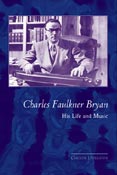Charles Faulkner Bryan
His Life and Music

- Author(s): Livingston, Carolyn
- Series:
- Imprint: Univ Tennessee Press
- Publication Date: 2003-05-23
- Status: Active
- Available in Hardcover - Cloth: Price $38.00 | Buy Now
- Leaf eReader required for PDF ebooks
Recognized as Tennessee’s first composer of art music, Charles Faulkner Bryan blazed many trails. He was the first Tennessee composer to have a work performed by a large symphony orchestra, the first Tennessee musician to be awarded a Guggenheim Fellowship, and the first composer anywhere to write a symphony based on white spirituals. Further, he reached a large audience with works performed at Carnegie Hall and on national radio. Although he died in 1955 at the tragically early age of forty-three, he left a rich legacy.
This biography explores Bryan’s life and work as a music educator, folk music performer and researcher, and composer, along the way providing new insights into Southern culture, music, musicology, and folklore. Appalachian folk music was the connecting thread in the rich tapestry of Bryan’s life, and Carolyn Livingston has woven the many strands of his career into a seamless and compelling account.
Drawing on previously untapped archives and on interviews with the Bryan family, Livingston depicts the rise of a hardworking musician and educator from the Tennessee mountain country. As a folklore advocate, Bryan’s compositions reflected both the preservation and the transformation of regional culture, and his performances in that genre drew audiences to college campuses well before the folk music revival of the 1960s.
But it was as a southern Americanist composer that Bryan offered a unique perspective on the American neo-romantic scene of the 1930s and 1940s. He incorporated black spirituals, white spirituals, and Appalachian folk tunes into larger works, such as his folk opera Singin’ Billy. His choral arrangements, including “See Me Cross the Water,” represented his joy in music and celebration, and his “White Spiritual Symphony” reflected his appreciation of his heritage with such themes as “Goin’ Over Jordan.” Livingston discusses selected examples of his music in detail.
As scholars and music enthusiasts renew their acquaintance with twentieth-century regional composers, Livingston’s detailed work allows us to gain a new appreciation of Bryan. This book depicts a visionary who mastered composition, education, performance, and research, and it contributes to our understanding of the cultural transformations taking place the first half of the twentieth century.
The Author: Carolyn Livingston, a native of Tennessee, is professor and director of graduate studies in music at the University of Rhode Island.
